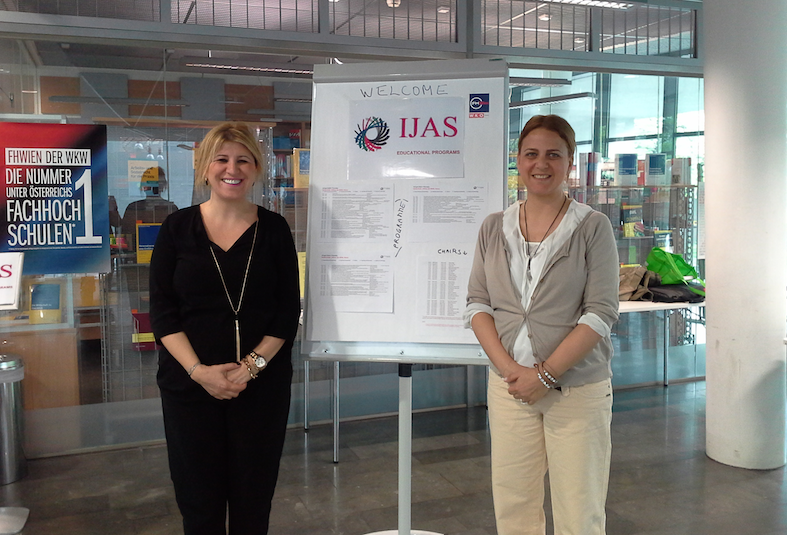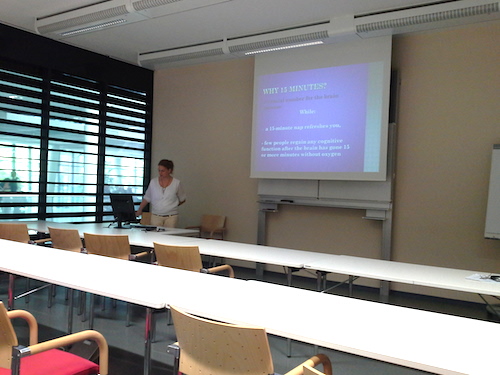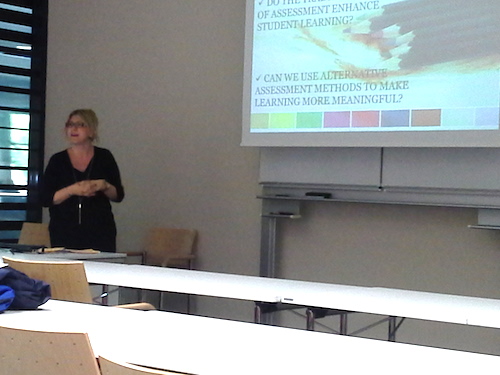IJAS: A Multi-Disciplinary Conference in Vienna

INTERNATIONAL JOURNAL of ARTS & SCIENCES VIENNA 2014FHWien University of Applied Sciences of WKW
by Suzan Altıparmak & Seda Ertüm Emirler
IJAS is a multi-disciplinary conference designed for a general audience. Presentations are 15 minutes long which allows participants to join many sessions.
 My session (Suzan) was on SWOT Analysis which is a guide and a tool to identify the Strengths/Weaknesses/Opportunities/Threats of an organization. Without changing its aim, I have tried to adapt this tool for educational purposes under 4 categories which are: 1.Icebreaker/Personality analysis, 2.In one-to-one tutorials with students for goal setting purposes at the beginning of a semester, 3.Problem/solution discussions for any given problem, 4.Peer Feedback tool for writing
My session (Suzan) was on SWOT Analysis which is a guide and a tool to identify the Strengths/Weaknesses/Opportunities/Threats of an organization. Without changing its aim, I have tried to adapt this tool for educational purposes under 4 categories which are: 1.Icebreaker/Personality analysis, 2.In one-to-one tutorials with students for goal setting purposes at the beginning of a semester, 3.Problem/solution discussions for any given problem, 4.Peer Feedback tool for writing
My presentation aimed to give a brief insight into my classroom experiences with SWOT analysis and provide the audience with student samples.
My session (Seda) was on continuous assessment: a non-traditional way of assessing students in higher education. I presented my findings on what my students thought about traditional exams vis-à-vis continuous assessment. I also talked about what kind of continuous assessment methods we could apply in our classes and also the benefits these methods would bring to evaluate the outcome of students’ learning.
SOME KEY POINTS from the CONFERENCE:
A BRAND NEW PLAGIARISM DETECTION SOFTWARE COMPARED TO CURRENTLY AVAILABLE ALTERNATIVES
Plagiarism in history was actually considered respectable as a sign of copying important work so that they would become known worldwide. Paraphrasing came out of discussions as an alternative and legal way. Among plagiarism detection software are: Google, KOPI, Plagiarism Detector, Dupli Checker, Plagium, Paper rater, Plagiarisma etc.
The functions of these are text selection, multiple documents selection, document storing, reporting, etc.
All these software and their functions have their pros and cons. The presenter claimed that the program he developed has less disadvantages compared to the other programs; it can be found in Windows Store under the name of “AntiPlag”.
 TEACHING SPEAKING TO ALBANIAN STUDENTS
TEACHING SPEAKING TO ALBANIAN STUDENTS
As little time is allocated to speaking classes in Albania, the government has made changes to the curriculum. Speaking is defined in the curriculum as the: “process of building & sharing meaning through the use of verbal and non-verbal symbols in a variety of contexts’’. The goal is to encourage the acquisition of communication skills both in and outside the classroom. An effective speaking activity should be as follows and the oral assessment criteria designed around this:
oLearners talk a lot
oAll get a chance
oMotivation is high
oLanguage is comprehensible
oStudents speak the target language
Ways of organizing the classrooms are pair work, group work and whole class and possible activities are role plays, simulations, interviews, reporting, information gap, etc.
Difficulties for Albanian learners are: sound & spelling / adjective & noun order / contracted forms / asking questions / subject pronouns / word invention / past simple & past perfect / use of articles / idioms & phrasal verbs / interactive communication / turn taking.
PERSUASION STRATEGIES IN PUBLIC SPEECH: LEXICAL MEANS & STYLISTIC DEVICES
Persuasion is a process in which a speaker presents a message intended to affect an audience in a specific way to change the attitudes, beliefs, intentions, motivations and behavior of many people. The most eloquent form of public speeches is presidential inaugural addresses. There are three important factors affecting them which are:
•Logos: (perceived intelligence, virtuous character and goodwill
•Pathos: (the use of emotional appeals)
•Ethos: (the use of reasoning, either inductive or deductive)
Important lexical items in formal speech are verbs / intensifying adjectives & adverbs / personal pronouns and stylistic devices are special repetition, arrangement or omission of words with literal meaning.
Most important of all, the speaker should be able to make effective use of Anaphora / Similes / Contrast / Inversion / Rhetorical Question / Metaphor / Epithets / Personification.
IS TRANSLATION ACCEPTABLE AS A TEACHING TECHNIQUE WHEN TEACHING A FOREIGN LANGUAGE?
This presentation was about the findings of research carried out with 121 students and 82 teachers.
87% of students asked for certain words to be translated only
92 % of students asked for translation when they could not understand
77% wanted to have translation as a steady protocol
87% considered translation to be very helpful
44% of students found it useful if used all the time
96% of the teachers resorted to translation
55% agreed to have translation as a teaching protocol if all other methods fall short
4% found translation helpful when used extensively
0% agreed to translate whole lesson
READING THE GEZI RESISTANCE OVER THE CONCEPTS OF HANNAH ARENDT
The presenter analyzed Gezi through the definitions of Arendt who was a German-American Political Theorist.
•Political action: taking a position with a simple one word called “no”
•Natality: announcement of itself to the word with the new inception
•Dasein: “everydayness”
•Hope: consequence of collectiveness of humanity
•Speech: base of freedom and equality
•Violence: plurality should be protected in the sense violence vs self-defense
WEBLOGS ARGUMENTATION IN THE MICROSCOPIC LENS
This presentation focused on a cultural issue which is the use of blogs in Malaysia. Similar to Turkish culture, face-to-face communication and written communication are quite different from each other. Blogs also differ in different cultures in terms of language and context. Blogs are a convenient medium of communication within one culture and across cultures, therefore, even if the writers are from different backgrounds, they should keep in mind that they have a global audience. Because of this, blogs are prone to misunderstandings and miscommunication. In western cultures, the message is linear and to the point, whereas, in eastern cultures, focus is on how it is being said. Similarly, problem solving is linear in the west, while it is circular in the east. Despite the misunderstandings and political tension they may cause, blogs are essential because they are a very powerful tool, an unconventional method of journalism, a change agent for cross-cultural communication and they have widespread use for global consumption. The need for socio-political weblogs arises from the fact that they constitute a discussion site with an empowering role and allow room for persuasion. Argumentation is fundamental for weblogs because it is an art of effective reasoning and allows more public participation.
For this research, 10 Malaysian “sopoblogs” were randomly chosen to analyse the structure of argument. The results of the analysis showed that 9 out of 10 were negative and none were positive in terms of their standpoint. The conclusion of the research is:
•Structure of argumentation for Malaysian blogs is complex
•Multiple standpoints should be avoided to avoid multiple argumentation
•Standpoints should have clear indicators
•Signposting is essential
•Any lesson plan regarding weblog writing should take into consideration cultural differences
DEVELOPING CROSS-CULTURAL COMPETENCE WHEN TEACHING ABROAD: UNIVERSITY EDUCATORS’ EXPERINCES:
Although there is a lot of research on studying abroad, there is little on teaching abroad. The benefits of teaching abroad were analyzed in terms of teaching, learning, scholarship and tolerance. Teaching abroad can also be called cross-cultural / multi-cultural / international intercultural / global / transnational teaching. Participants involved in this research had to work as full time teachers and have an MA or PhD. The results were basically that people who are interested in cross-cultural education need to have certain competences and need to be able to adapt.
MARITIME STUDENTS’ PERCEPTION TOWARDS DRAMA AS A WAY TO REDUCE ANXIETY
This presentation focused on what Malaysian maritime students think about the use of drama activities in class. Students were at first hesitant about the activities, but later on 85% strongly agreed that ‘it is fun to participate in the making of an English drama in the course‘. They also agreed that drama has an impact on their language learning and on reducing anxiety. However, the presenter pointed out that grammatical mistakes should not be penalized, the emphasis should be on the performance. The main focus is to see drama activities as ways of decreasing anxiety.
